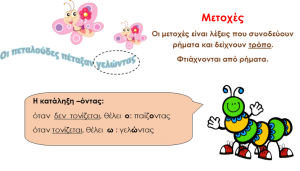Difference between revisions of "Language/Modern-greek-1453/Grammar/Participle-spelling"
| Line 1: | Line 1: | ||
[[File:d1d66-cebcceb5cf84cebfcf87ceadcf82.png]] | [[File:d1d66-cebcceb5cf84cebfcf87ceadcf82.png|thumb]] | ||
Revision as of 15:34, 21 March 2023
Verb spelling - present endings
| Verbs eding in : | are written with | Examples | Exceptions |
| -άβο / -αύω | β | Ανάβω : ignite, turn on
θάβω : bury Ράβω : sew |
Παύω : cease
Ψαύω : finger (ψηλαφώ, αγγίζω) |
| -έβο /-εύω | ευ | Κινδυνεύω: be in danger
παλεύω : struggle, wrestle |
Κλέβω : steal
Σέβομαι : respect |
| -έο /-έω | αι | Κλαίω : cry
Φταίω : wrong Καίω : burn |
Αναπνέω : respire
Λέω : tell Πλέω : float Ρέω :flow |
| -ένο /-αίνω | αι | μπαίνω :enter
βγαίνω : exit ανεβαίνω : ascend |
Δένω : tie
Πλένω : wash μένω :I remain |
| -έρνο / -έρνω | ε | Γδέρνω : flay
Φέρνω : bring |
Παίρνω : take |
| -έρο /-αίρω | αι | Χαίρω : nice
Συγχαίρω : congratulation Εξαίρω : glorify |
Ξέρω : know
Φέρω : bring, fetch |
| -ιάζο / -ιάζω | ι | Αγκαλιάζω : embrace
Νευριάζω : nervous Βιάζομαι : hurry |
Μοιάζω : resemble
Αδειάζω : evacuate Χρειάζομαι : need νοιάζομαι : care |
| The verbs ending in -ίζω form the participle
with endings in -ισμένος, -ισμένη, -ισμένο. -ίζο / -ίζω |
ι | ποτίζω : water, irrigate
γεμίζω : fill |
δακρύζω : shed tears
γογγύζω : grouch, growl δανείζω: lend, αθροίζω αθροίζω : sum up πήζω : congeal, set, etc |
| -λο / -λλω | λλ | ανατέλλω : rise, as for the sun
αναβάλλω : postpone |
Θέλω : want
Οφείλω : owe etc |
| (with a single –λ– in simple past
and in all the tenses which are formed based on simple past’s root) -λό / -λώ |
λ | Αμελώ : let slide
Γελώ : laugh Καλώ : called |
Κολλώ : adhere |
| The verbs ending in -ώνω form the participle with
endings in -ωμένος, -ωμένη, -ωμένο. -όνο / -ώνω |
-ω | σιδερώνω (iron) –> σιδερωμένος
τελειώνω : finish λερώνω : sully θυμώνω : get angry |
|
| -σο /-σσω | σσ |
Παρατάσσω : array, deploy |
Αρέσω : be liked |
| -το / -ττω | ττ | Εισπράττω : collect
διαπράττω : perpetrate |
Θέτω : pose
Κείτομαι : repose |
| -ίνο |
-ίνω -ήνω -ύνω
|
Δίνω:, give, κλίνω :
Αφήνω : let go αμβλύνω : dull απομακρύνω : remove |
|
| -είνω |
Κλείνω : close Τείνω : tend |
Author
- Ευγενική χορηγία που στοχεύει να βοηθήσει μαθητές ή μη, απανταχού της Γης, που επιδίδονται στην εκμάθηση της ελληνικής γλώσσας!
- Contribution bénévole visant à aider les personnes, partout dans le monde, qui sont engagées dans l'apprentissage de la langue grecque !
- Voluntary contribution aimed at helping people, all over the world, who are committed to learning the Greek language!
